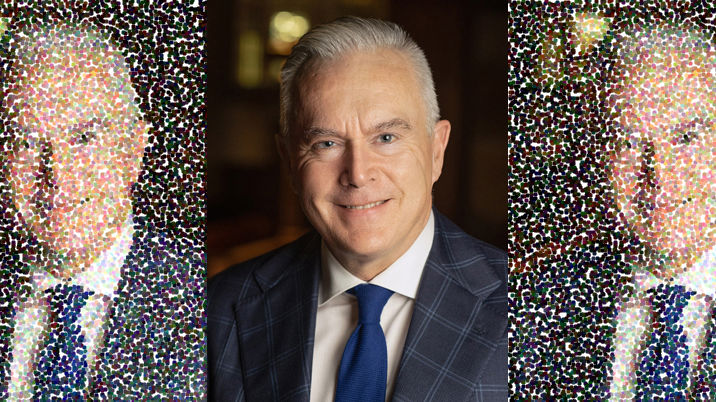
Dog eat dog is hardly an unfamiliar idiom in the media world. But the Huw Edwards scandal has put the BBC and its beleaguered director general Tim Davie in the unfamiliar position of being savaged not just by the Auntie-baiting usual suspects, but by its traditional friends. The future of Davie himself is under a heavy cloud in the court of public and political opinion as its former news kingpin awaits a sentencing appearance in the criminal dock next month and a potential hefty prison term.
Even as far right inspired riots rocked the nation and Olympic glory stories grabbed attention, acres of newsprint and bulletin airtime was still heavy with comment and fresh revelations about Edwards’ downfall in the wake of his July 31st guilty plea. Sample, for example, the Sunday Mirror splash on August 4th ‘BBC Chief Should Quit Over Huw’ would have made indigestible breakfast reading for DG Davie.
It was based on an interview with the teenager whose parents triggered the July 2023 Sun newspaper front page that – without naming him – opened the door on the dark secret life of a top BBC presenter later revealed to be Edwards by his now estranged TV producer wife Vicky Flind in a statement announcing he was undergoing treatment for serious mental health issues.
That at least put a stop to a social media witch-hunt with other innocent BBC presenters being falsely identified. But it forced the BBC to admit how it had badly handled (some of us would argue covered-up) the original complaints by the drug-troubled teenagers’ parents over Edwards paying thousands of £s for sexually explicit poses online. Until last week, the teenager had defended the presenter, refusing to give interviews and police decided that because the youth was over the age of consent, no crime had been committed. Nevertheless, to its credit, the scandal might never have emerged without that original Sun front page. In the new Sunday Mirror interview, the young person said he now realised he had been ‘groomed’ by the presenter and called for Tim Davie to be sacked.
Last Sunday’s Observer headlined ‘Shows disappear from iPlayer as BBC removes Edwards from archive’ along with a sub-head ‘Charities in Wales supported by disgraced television presenter also act to disavow his patronage’. The BBC, it reported, has ordered that footage of a sombre, black tied Huw Edwards announcing The Queen’s death and that of Prince Philip should not be shown again, while plans are apparently under way to remove all traces of the anchorman’s lead role in covering King Charles coronation. Even a guest appearance on an old episode of Dr Who is being removed from the archives.
Warning signs missed
The Sunday Times front page carried a second lead headlined ‘BBC board demands answers from director-general over Edwards scandal’ while a full page inside under the headline ‘Downfall of ‘King Huw’ went on to challenge, “Rumours about messaging young colleagues. Complaints made, then withdrawn. His arrest was a closely guarded secret. After the host’s conviction over child abuse images, BBC staff want to know why bosses acted like courtiers around a man who seemed untouchable.”
The paper also revealed the BBC has secretly been paying for therapy for a vulnerable woman in her 40s who made two complaints about Edwards’ online activities as far back as May 2021 and January 2022. Although Edwards was ‘informally’ warned by BBC superiors about his online activities, he didn’t desist but nothing more was done. Ditto past complaints by junior colleagues around inappropriate messages and approaches by the corporation’s star news presenter.
In an excruciating revelation, the woman known only as Rachel told the Sunday Times that she at first thought she was being ‘catfished’ by someone posing as the ‘great Huw Edwards’ so she asked him to prove it by wearing a pink tie to read the news that evening and he duly obliged. Embarrassingly, she also disclosed how Edwards told her during their bizarre online relationship how disillusioned he’d become with the BBC calling it a ‘shithouse’ and complained about being overlooked for leading the 2017 general election coverage rather than David Dimbleby and likewise Question Time going to Fiona Bruce not him.
In June 2022, he wrote to her “Now I’ve shown the other f***wits how it’s done I can f**k off out of here.” That reflects my own sources telling me for some time that Edwards had been secretly and unsuccessfully courting other broadcasters over the past couple of years who were put off either by his pay demands or because they had picked up on what one former colleague told the Sunday Times, “People felt he was taking risks and that he was becoming a megalomaniac, there were rumblings about him sending messages to young staff.”
Poor crisis management
In its main August 2nd leader headlined ‘Question Time’, sister title The Times opined: “Huw Edwards’ downfall raises serious concerns about the BBC’s internal processes. The national broadcaster must be transparent as to what it knew and when.” Hard to argue with its depiction of the BBC’s crisis management as ‘opaque and dilatory’ or its prescription of ‘transparency’ as the ‘best disinfectant’ for a national institution locked in reputational intensive care.
Inevitably, other headlines have piled the pressure on the BBC hierarchy like the Daily Mail’s August 2nd, ‘Huw gamed the system – playing the mental health card and using his vast BBC salary to build a legal wall around himself’. I didn’t put it quite so cynically when the BBC News Channel asked me to talk about the case minutes after his guilty plea but I did say that Edwards’ defence team would be guaranteed to mount a mitigation argument against a jail term on mental health grounds. While predicting that anything less than a custodial sentence would spark public and media fury and further damage the BBC’s tarnished reputation, despite the fact that it would be up to a judge reviewing various psychiatric reports before deciding his fate. I couldn’t help remarking either on Edwards’ surreal appearance strolling in front of the massed cameras after his guilty plea wearing his fashionable shades and smart blue suit. Far from being the equivalent of America’s famed ‘perp walk’ of shame this was a man who, if he could no longer report the biggest story of the day, was somehow savouring being the subject of it.
Until recently, child porn images as serious as some of those Category A ones figuring in Edwards’ case would almost certainly warrant a prison term. But the 25-yr-old fellow Welshman and convicted paedophile who supplied Edwards only received a 12-month suspended sentence and a place on the sex offenders register. You can anticipate Edwards’ high-powered legal team contending that a stiffer sentence would be ‘unfair’ and based on his high-profile position as the ‘trusted’ former figurehead of BBC News. There is suspicion, too, I suggested on air that non-custodial sentences are being made for these offences because of Britain’s prison space crisis.
A pattern?
Inevitable, too, I was asked by various broadcasters how the BBC’s ‘mishandling’ of the Edwards scandal compared to that of the Jimmy Savile scandal. (I was the Sunday Mirror editor legally thwarted from exposing Savile in 1994 and subsequently I’ve featured in various documentaries, including a couple where the BBC examined its own failures.) Very different scandals, yes, but with the common thread of failing to heed red flags, respond seriously to complaints or burying evidence about highly-rewarded ‘big talent’.
There is a renewed irony in that the BBC killed the original Newsnight exposé of Savile’s mass paedophile proclivities after his death in favour of a 2-part tribute to him. Now Corporation chiefs stand accused of a hostile reaction to current Newsnight lead presenter Victoria Derbyshire and her team’s earlier efforts to expose Edwards’ workplace ‘impropriety’ with accusations they were ‘turning on one of their own’. But colleagues who initially defended Edwards, such as recently retired royal correspondent Nicholas Witchell, are publicly apologising and echoing the call by the new secretary of state for culture, media and sport, Lisa Nandy, for the £200,000 of public money the presenter earned after his suspension to be clawed back. It was a demand Nandy delivered in a terse conversation with Tim Davie and the DG has promised to try and persuade or compel Edwards to do so.
Although the new Labour government is openly more supportive of the BBC than its Tory predecessor, it is also alert to the dangers of being seen as a ‘soft touch’ by the public and the Edwards case is the first pivotal test of that. Not least with the left and right wing newspapers united in its criticisms of how the Edwards affair has been mishandled.
The pressure on the BBC leadership has stepped up with the revelations in the Sunday Times and elsewhere that four key figures – Davie, former acting chairwoman Dame Elan Closs Stephens, senior independent director Sir Nicholas Serota and Deborah Turness, the chief executive of BBC News – for months harboured a dark secret from all of their colleagues. They had known since last November that the BBC’s most trusted news anchor had been arrested on suspicion of viewing images of child sex abuse. Some BBC board members are busy briefing media contacts (privately so far) on their fury at not being informed.
In the case of the generally respected Turness, who removed herself from overseeing the coverage of Edwards’ court appearance and its fallout, many of her staff are angry over being kept in the dark and question the BBC leadership complying with a Scotland Yard request for ‘confidentially’ over his arrest. “Would we have been so acquiescent in staying mum if it had been any other famous figure than Huw Bloody Edwards?” was how one very senior BBC presenter put it to me privately. The decision not to sack Edwards, let alone keep paying his £475k annual salary and give him a pay rise while off air, has devastated rank and file morale against the backdrop of the corporation’s hefty budget cuts and redundancy policy.
Looking back, the Savile scandal fallout cost one BBC director general his job with an almighty row over a half million £ plus pay and pension compensation package. Could the same fate await Tim Davie, dubbed by some sceptical BBC journalists as ‘Teflon Tim, the man who can survive any scandal’.
Maybe, maybe not. That could hinge on two big tests…. how successful is he in trying to claw back two hundred grand from Huw Edwards and how well does he perform in front of the cross-party parliamentary DCMS select committee? Although not yet convened after the hasty general election, it is a racing certainty that its first big inquiry will be the into the BBC’s handling of the Edwards scandal with Davie, Turness and BBC chairs past and present summoned to appear, regardless of the sentence imposed on their disgraced presenter.
The committee is also likely to include the bullying furore around the BBC’s flagship entertainment show Strictly Come Dancing in its inquiry. Across the aisle, politicians’ antennae are tuned in to the growing allegations of tardiness and transparency failures around the corporation’s own investigations into both the Edwards and Strictly issues.
It is guaranteed to be high political theatre played out to massive and intense media coverage. Whether or not Huw Edwards ends up in jail, the story of his downfall is set to run and run and ultimately his might not prove the only head to fall.












